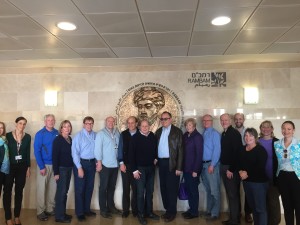OP-ED, The Jewish AdvocateBy Stan RosenbergMassachusetts Senate President “We want you to leave with more questions than answers.” That was the challenge posed to our group as we settled onto the tour bus, having just landed at Ben- Gurion Airport. An ostensibly odd objective for a ten day trip, promoted as a study tour and designed to give our delegation from the Massachusetts State Senate an in-depth look into the political, security, and economic challenges and successes facing Israeli society. For a group of legislators, in particular American legislators, who are usually tasked with finding the answers or solutions to questions, this was no modest ask. This challenge served as our first introduction to one of the central themes that would accompany our group throughout the trip; a request, really, for the group to take off its American glasses. To absorb what we would come to see and hear not through an American filter, an American perspective, but rather attempt the difficult undertaking of understanding the reality of a place from the people who live there.
This being my third visit to Israel over the past thirty year period, I was no stranger to the apparent complexities of this rich, beautiful country. But it was clear from the onset till the conclusion of the trip that the Jewish Community Relations Council, the tour’s sponsor, was strongly committed to its initial goal of constructively revealing the even deeper layers of this conflict. Through a diverse selection of speakers, organizations, and visits, we were given the opportunity to see and hear multiple perspectives of the same reality. The intricate nuances of the Israeli-Palestinian conflict were emotionally conveyed to the group by speakers like Bethlehem Mayor Vera Baboun, who explained the frustrations of trying to govern her West Bank municipality that is largely bordered by Israeli controlled areas. Or Rami Nazzal, a Muslim Jerusalemite, who works in the West Bank as a New York Times contributor and painted a picture of a Palestinian society that is both struggling to survive in some corners while economically prospering in others.
We traveled to Moshav Netiv Ha’asarah, a community wedged against the security barrier near the Gaza strip, to hear from residents about the daily security challenges they face, like making the difficult choice to demolish half of their community playground in order to make space for yet another security room, commonly known to us as a bomb shelter. The group had a discussion with Colonel Benzi Gruber on the ethics and dilemmas of the battlefield, a gripping presentation on the extensive efforts made by the Israeli Defense Force to avoid collateral damage for humanitarian and ethical reasons, but also for strategic ones.
 Senator Rosenberg (center) and delegation at Rambam Hospital in Haifa.
Senator Rosenberg (center) and delegation at Rambam Hospital in Haifa.
Despite the often muddled depiction that we were presented, we were not lacking for moments of inspiration and hope for the future. We were encouraged by Professor Dalia Fadila, the first woman appointed president of an institution of higher education in Israel, about her efforts to empower Israeli Arabs, especially women, through education. We talked with the parents and administrators of the Yad BeYad (Hand in Hand) Bilingual school, who are dedicated to bringing together Jewish and Arab children in a positive and natural learning environment. Through conversations with LGBT advocates, like the Yerushalmim movement or the Aguda, we discussed how the Jewish population of Israel is hardly a monolithic entity itself and groups within are struggling for their own levels of equality and inclusivity. This diverse collection of voices, often delicately or sometimes intensely contrasting one another, led to a richly complicated tapestry of history, politics, culture, and religion.
However, through visits to start-up incubators and accelerators, meetings with venture capital firms, and conversations with students, entrepreneurs, and government officials, we did learn of an area of Israeli society where there was some consensus; the success of the start-up and high-tech industry. Many noted the unique historical and cultural characteristics of Israel as major contributing factors, from mandatory military service, to the sociological effects of Israel being a start-up itself. But of the causes that could be applied to strengthen our own robust start-up and hi-tech landscape, there was credit given to favorable tax policies attracting international companies, providing incentives for start-ups to establish themselves in desired locations, and promoting R&D focused initiatives. Great emphasis was also given to the need for growing fun, affordable cities that attract and retain the young, educated workforce. Both types of initiatives we continue to explore and implement here at home.
For a country similar in size to our own Commonwealth, to be competing on the international level in talent, technology, and innovation is nothing short of remarkable. This success has developed while searching for a balance between the need to ensure security for its people and an ongoing commitment to be a democratic, pluralistic nation. Ultimately the goal of our trip was not to solve a problem, or know the answers, but to gain a greater, more nuanced, and authentic understanding of a people, place, and culture. While not the most immediately satisfying of objectives, it was one certainly deserving for such a complex reality.
Stan Rosenberg is President of the Massachusetts State Senate.




